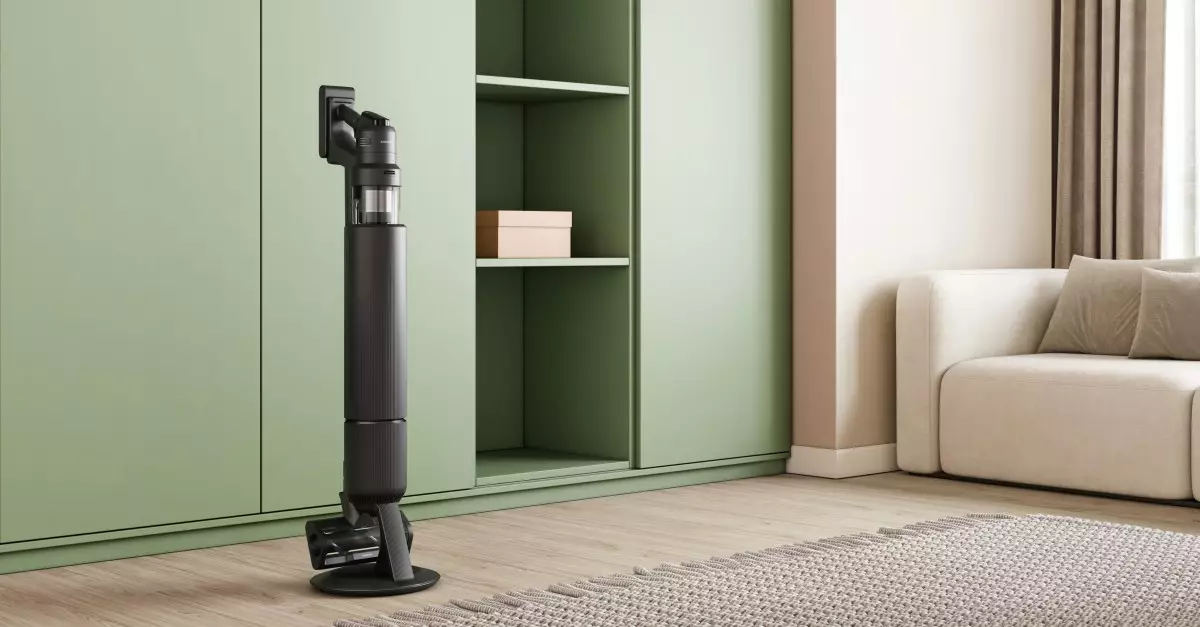In our fast-paced, notification-driven world, the integration of technology into everyday tasks offers both convenience and complexity. Samsung has made significant strides in this arena, with its Bespoke Jet AI vacuum and laundry appliances leading the charge. This isn’t merely about appliances with advanced capabilities; it represents a shift toward a fully interconnected home that responds to our needs in real-time. With features like the LCD display integrated onto devices, Samsung is rapidly transforming how we perceive and interact with household chores.
Imagine vacuuming while also staying connected to your digital life. The Bespoke Jet AI vacuum is engineered to allow users to receive call notifications and read text messages without pausing their chores. Priced at $1,099, this vacuum is a luxury gadget melding utility with up-to-the-minute connectivity. It boasts 400AW of suction power and an impressive battery life of up to 100 minutes. Yet, while the techiness excites many, is this smartification an enhancement, or is it simply making chores more complicated?
Next-Gen Laundry Solutions
The Bespoke AI Laundry Vented Combo washer/dryer comes equipped with a 7-inch LCD display, allowing for phone call reception directly from the appliance. Priced at $3,099, this combo unit facilitates seamless communication while eliminating the need to dash across the house for a missed call during laundry. In addition to the call features, the machine autonomously dispenses detergent and even opens its door post-cycle. It promises a new era of convenience — but at what cost?
While these features sound revolutionary, they also invite a question: Is this level of intelligence too sophisticated for our simple tasks? Convenience does bring efficiency, yet the question of user interaction remains. Do users really wish to engage with their washing machine in this way, or is the convenience factor overhyped?
A Comprehensive Smart Home Experience
As we delve into the broader spectrum of Samsung’s offerings, it’s clear that the AI Home technology extends far beyond just cleaning appliances. The integration of these touchscreens into refrigerators, ovens, and even smart faucets exemplifies the company’s ambition to create a harmonious and connected environment. Through Samsung’s SmartThings platform, users can now manage different devices with a unified interface, making interactions more intuitive.
For instance, if dinner preparations are ongoing, users can pull out a recipe on their fridge’s touchscreen, which can be linked to the oven for precise cooking instructions. It’s as though our appliances function as an external brain for household tasks. This level of connectivity seems savvier, yet it raises another concern. As our homes become increasingly monitored and controlled by tech, are we risking privacy for convenience?
The Double-Edged Sword of Smart Displays
Samsung’s adoption of screens across its appliance suite could be seen as visionary; however, it is not devoid of skepticism. Many worry that these devices could transform from aids into invasive presences in our homes. There are legitimate concerns about the potential for ad placements or unnecessary up-selling that may come with interconnected screens. While Samsung currently forgoes such intrusive advertising, users wonder, how long will it be before these innocuous displays start serving banners and promotions that interrupt our valuable time at home?
Additionally, while touchscreen technology offers ease of use, they can also introduce new frustrations. Screens can malfunction, become obsolescent, or even break, leading to costly repairs. In contrast, traditional knobs and buttons have a much longer track record of reliability. Investing in a smart appliance also means accepting the risks associated with newer technologies that may not stand the test of time.
Balancing Innovation with Practicality
As we contemplate the rise of smart home technology, it is imperative to consider the balance between innovation and practicality. Samsung’s efforts to ensure that appliances double as communication tools can streamline our daily routines, but they may also complicate them. The allure of such gadgets is undeniable — the convenience factor pulls many into its embrace. However, does this represent a genuine improvement in our lives, or is it an over-engineered response to simple tasks?
In essence, while the smart home is portrayed as a frontier of efficiency, it is essential to remember that not every task requires digitization. The beauty of home life lies in its simplicity, and perhaps there is value in preserving some aspects of our daily routines as they have always been. As consumers, we must weigh these advanced features against the fundamental question: Are they truly serving us, or are we merely serving them?

